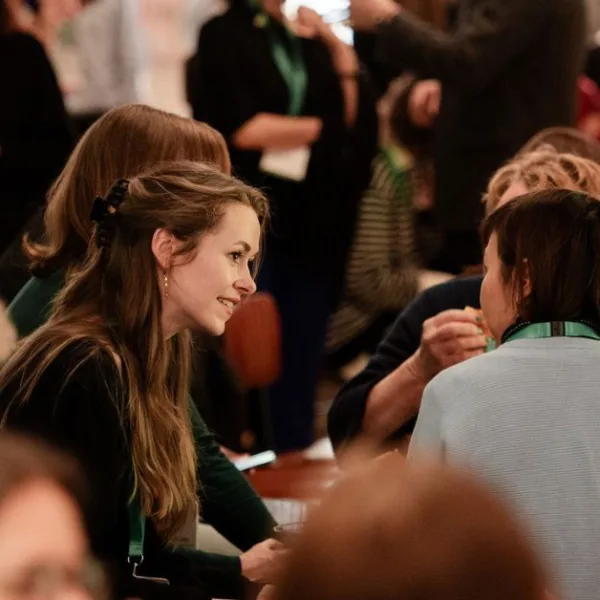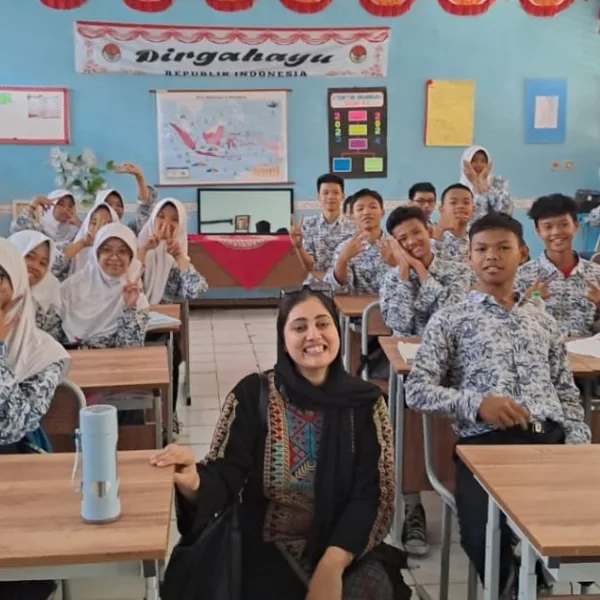Hammed Kayode Alabi has dedicated his life to youth empowerment and working with underserved and displaced communities to transform education in Africa. His journey started eight years ago when he spotted a gap in the African education system. Hammed was working at a palm kernel factory in Nigeria and noticed children outside during school hours.
“I would ask them questions such as why they were not in school and their career plans. There are a lot of gaps within these underserved communities,” he explains.
Hammed is originally from Makoko, one of Africa’s largest floating slums in Lagos, Nigeria. His early life is marked by personal loss and financial hardship.
He says: “As someone who was supported to go to university, I thought I could use my own lived experience to help the community. I lost my mum when I was seven, my dad was unemployed at one point, and my younger brother dropped out of school for a year.”

Youth empowerment
Hammed turned these life circumstances into drive and worked hard at school. He was awarded the best prefect in his secondary school while working part time as a labourer on construction sites and teaching in a nursery. At the age of 17, Hammed was admitted to the University of Ilorin in Nigeria to study a BSc in Human Kinetics Education. While he was at university, he ran free tutorials for students. When he was 19 he won the University of Ilorin scholarship award and at the age of 21 he graduated as the best student in his department.
After graduating from University in 2015, Hammed wanted to empower young leaders in his community to change education in Africa. He found a school in the community that was lacking in resources and asked the principal if he could run a boot camp.
“We talked to the kids about their career paths, and they had loads of questions. Students need space to explore their creativity so we created the bootcamp. This involved groups of young people identifying problems in their community and creating solutions to them. This allows them to develop skills like critical thinking, creativity, emotional intelligence and teamwork.”

Transforming education in Africa
In 2017, Hammed founded the Kayode Alabi Leadership and Career Initiative (KLCI), which has since trained more than 10,000 young people across 14 Nigerian states in leadership skills. In 2020, Hammed took on a new challenge: a master’s degree in Africa and International Development at the University of Edinburgh.
The University appealed to Hammed due to its world-renowned Centre of African Studies. He says: “Edinburgh is grounded in Africanness. I chose to study African theory to help with the regional work I was doing.”
Before his degree, Hammed worked as a regional manager of Peace First, a non-profit organisation that teaches young people about change-making in 150 countries. He is still a board member there.
“I travelled to Kakamega in Kenya and saw young people brimming in ideas to create social change. Through my role at Peace First, I met young people from almost 30 sub-Saharan African countries. I wanted to deepen my knowledge in this area. The Centre of African Studies at the University provided an avenue to do that.
“The Mastercard Foundation Scholars program for people who look like me was appealing. Growing up in a slum and losing my mum when I was seven, I did not have the resources to study in a place like Edinburgh. This meant I took advantage of the experience.”
Hammed continued his role at Peace First as a board member while studying at the University. He says the course gave him the tools to take his work even further.
He says: “The good thing about studying at the University is that I did a placement-based dissertation where I looked at refugee access to higher education in Uganda. This allowed me to understand the challenges refugees face even more.”

Providing for underserved communities
After graduating, Hammed worked for Refugee Education UK in London. This involved giving young refugees and asylum seekers in West London mentoring opportunities and helping them deal with the challenges of language barriers and the education system.
In 2023, Hammed founded Skill2Rural.Org, an EdTech startup, which reached 415 users in just eight months. Educators signed up on the platform are currently reaching 128,000 young people across Africa. He has also recently launched Rafiki AI. It has already reached over 2,000 users from 44 countries.
He says: “After my degree, I now understand my work because I look at who is marginalised and supported. For example, I recently created Rafiki AI, Africa’s first generative AI careers advisor for underserved and displaced young people. When I was building it a lot of these questions came into my mind: why are you designing for these people? For what purpose are you designing it for? If you build it on the web platform, who is going to be marginalized because of that?”

Receiving recognition
Hammed won the Being Edinburgh Alumni Award 2025. This is an annual prize celebrating someone in the University’s alumni community who makes an impact on the world.
He says: “Winning the competition means there are people who see the work that you do and think you deserve recognition. For me that’s the greatest joy you can ever get. It is humbling that people from the MasterCard Foundation Scholars program team nominated me. I have so much gratitude to be a member of such a community and to have won the award as well.”

Making social change
Hammed advises others who want to make an impact to embrace small changes. He says: “Most people think that change has to be big, but actually it’s the tiny difference that matters. Can I show up a bit more? What if I design a website for an NGO that is struggling because I have the skills? Could I speak to some young people because I know how to tell good stories? Could I work with a struggling non-profit to create an AI solution together?
“I’m not saying people should not make a profit or work in big companies because we need people in those spaces as well. However, we should also reflect on our own privilege and what we can give to other people. What’s the essence of having a skill when you’re not using it for the good of others?”
Looking ahead, Hammed is continuing to expand RafikiAI, build a NetZero innovation hub in a remote riverine community in Nigeria, and share his insights through writing and speaking. He is the author of three books, nearly 200 essays, and is currently experimenting with posting daily on LinkedIn – a streak he’s maintained every day of the year so far.
“Africa isn’t just creating for Africa anymore,” he says. “Africa is creating for the world.”
Image credits: Being Edinburgh Award image Douglas Robertson. All other images – Hammed Kayode Alabi





